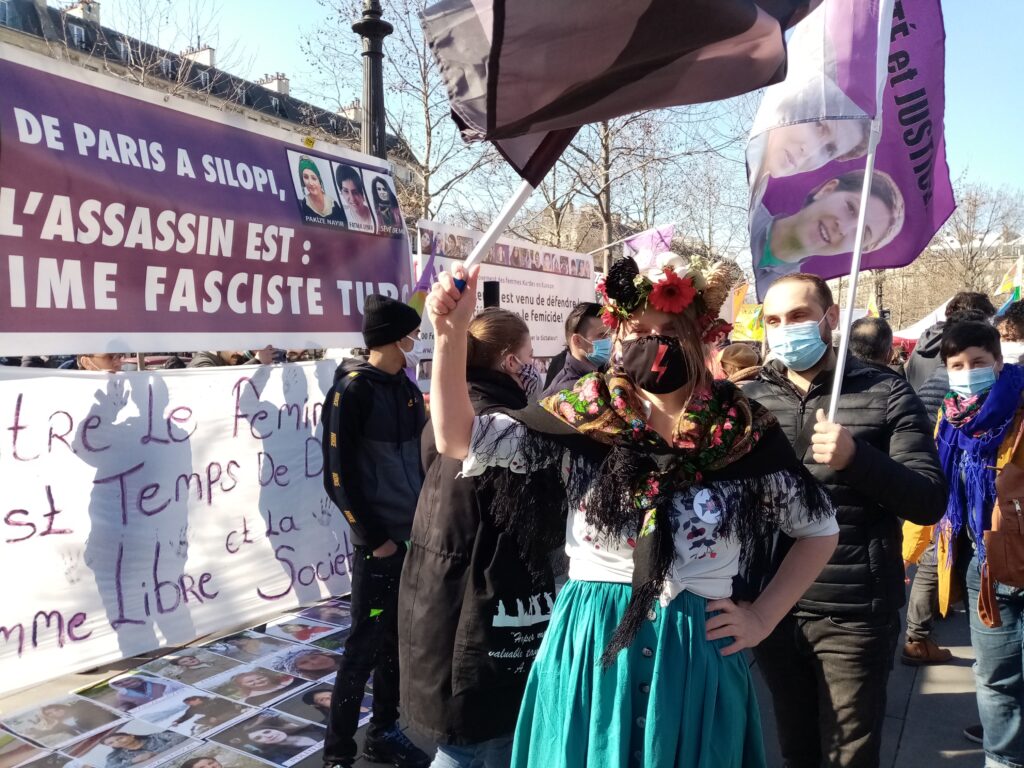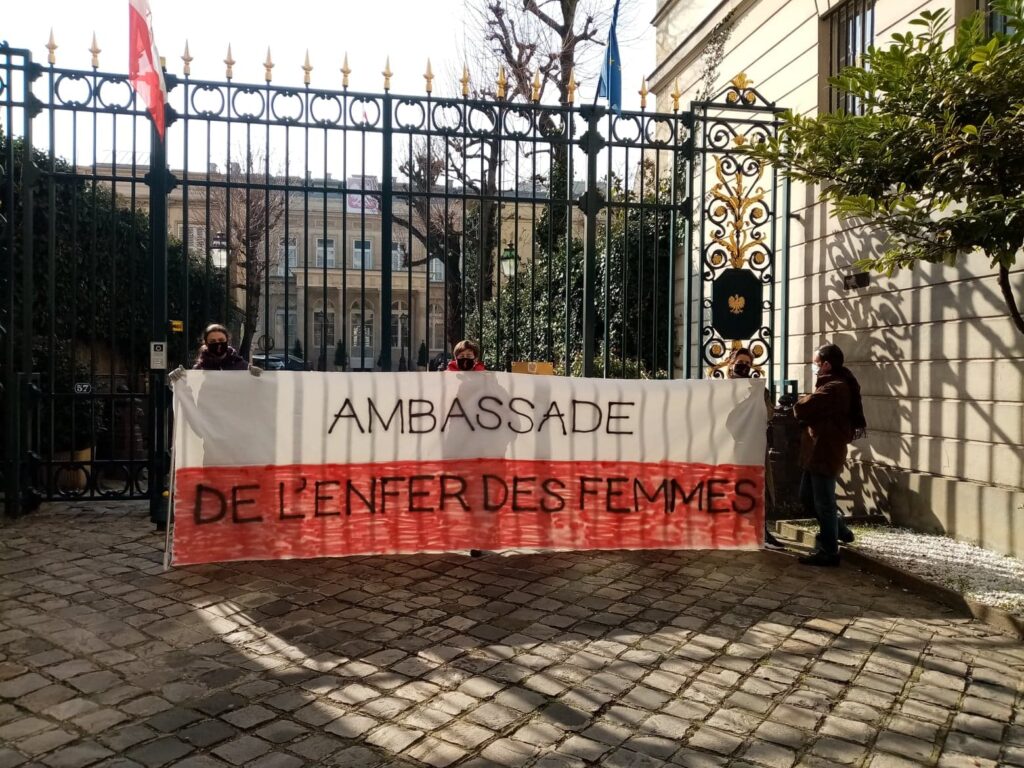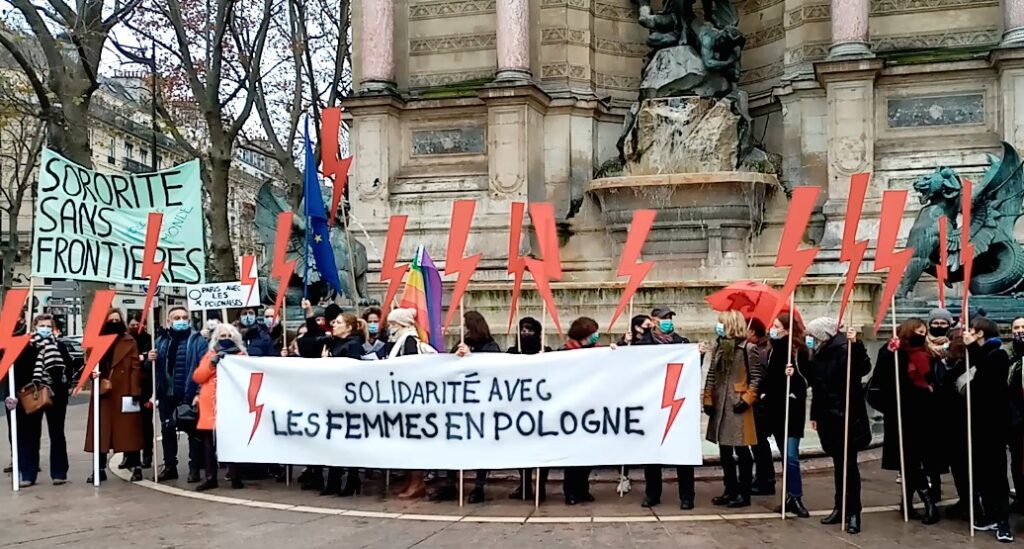Minds of the Movement
An ICNC blog on the people and power of civil resistance
by Agnieszka Żuk and Amber FrenchOctober 22, 2021
On this day last year, Poland's high court declared unconstitutional a law that authorized abortions in the case of fetus malformations. The move sparked protests in cities and small towns across Poland, many of them sprinkled with creative, sarcastic and humorous signs, slogans and posters. Some Polish diaspora groups in major cities worldwide actively joined the protests.

Gathering with, among others, "Nous d'abord" [We Come First] and the Association for the Defense of Democracy in Poland on the occasion of International Women's Day, Place de la République, Paris, March 7, 2021. Protesters used arts, humor and creativity, in the style of protests for women's and LGBT rights in Poland. Credit: Dorota Bielawska.

"Embassy of Women's Hell." Protest organized by a number of Polish diaspora organizations in front of the Polish embassy in Paris, March 8, 2021. Credit: Dorota Bielawska.

"Sorority without borders." "Solidarity with women in Poland." Paris, December 13, 2020. Credit: Dorota Bielawska.
Ordinary women, men, members of the LGBT+ community and—notably—teenage girls marched in the streets and demonstrated in front of government buildings, even inside churches. For their anger was directed not only toward politicians, but also the conservative segments of the Polish Catholic church—an institution that has steadily gained clout in the country's politics since the fall of the Iron Curtain and that is particularly influential with the current nationalist government.
Where is the movement today, exactly one year after the controversial court decision and major protests that it galvanized? What has changed in Polish society since? Which nonviolent tactics has the movement used and with what impact? What are the movement’s goals today? And in general, what are the prospects for defending women's rights in Poland?
Last week here in Paris, I had the pleasure of meeting Agnieszka Żuk, a Polish feminist, activist and author to explore these questions. Last winter, Agnieszka helped organize demonstrations with other members of the Polish diaspora in France to draw public attention and support for women back in Poland.
In the first segment of our interview below, Agnieszka discusses how the movement for women's rights first emerged in Poland. She also talks about who the 2020 protests targeted exactly, the goals of the nonviolent actions, and the composition of the movement as it has evolved. Agnieszka emphasizes the impressive recent mobilization of teenage girls, and also boys, to come out and say what had only been said in private, or in elitist feminist circles for years: that the Polish Catholic church's motives are not to protect babies but instead to control women's bodies, and enough is enough. WATCH:
In this next segment, Agnieszka's discourse shifts to how the Polish diaspora in Paris and other cities mobilized in support of women in Poland. The arts played a major role in their actions, whether it involved street performances, symbolic paintings and memes, or painting banners with creative slogans. The group of women in Paris who organized these actions is small but fierce, creative and relentless. WATCH:
In the final segment, Agnieszka shares that Polish women have allied with other struggles, namely struggles for the rights of the LGBT+ community, of handicapped persons, and of immigrants. These groups all have two things in common. The first is that the state-run television channel in Poland broadcasts propaganda and hatred directed toward them, "from morning until night," according to Agnieszka. The second element that unites these populations is that they are suffering the direct consequences of a weakening democracy, the state’s capture of the high court and other judicial institutions, in addition to government-controlled and directed public media in Poland. "It's one fight, it's one battle," says Agnieszka. WATCH:
After I cut the camera off, we continue chatting. Agnieszka emphasizes her hope in the next generation of women to bring about change in Poland. It will be a few years before this new generation of women reach voting age, but they are already building up their networks, honing their organizing skills, and training as activists. "They are different, and they are certainly not waiting for Prince Charming!" she exclaimed as I packed up my filming equipment.
Agnieszka later clarifies to me in a text what she meant by her remark: The “Juliets”—as they are ironically called because Juliet is a very popular name for girls in their teens in Poland today—don’t talk about broken hearts on Twitter but instead about social and political topics. Prince Charming is a figure from patriarchal society... which they are actively working to dismantle.

Agnieszka Żuk
Agnieszka Żuk is a Polish feminist, author and translator based in Paris, France. She conceived and edited the book, Hourras et désarrois. Scènes d’une guerre culturelle en Pologne (Cheers and Distress: Scenes of a Cultural War in Poland, Éditions Noir sur blanc, 2019). Agnieszka is an active member of the Polish diaspora and helped organize nonviolent actions in 2020 to support the movement for women’s and LGBT rights in Poland.
Read More
Amber French
Amber French is Senior Editorial Advisor at ICNC, Managing Editor of the Minds of the Movement blog (est. June 2017) and Project Co-Lead of REACT (Research-in-Action) focusing on the power of activist writing. Currently based in Paris, France, she continues to develop thought leadership on civil resistance in French.
Read More